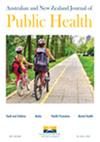Examining the impact of decriminalisation on sex workers in Victoria, Australia: Results from an online survey
IF 2.4
3区 医学
Q2 PUBLIC, ENVIRONMENTAL & OCCUPATIONAL HEALTH
Australian and New Zealand Journal of Public Health
Pub Date : 2025-06-01
DOI:10.1016/j.anzjph.2025.100250
引用次数: 0
Abstract
Objective
This survey aimed to examine the impact of decriminalisation on rates of sex worker’s condom use with clients, and sexually transmissible infection/blood-borne virus (STI/BBV) testing.
Methods
An anonymous, mixed-methods, online survey among sex workers in Victoria, Australia (December 2022-April 2023). This survey asked about changes in condom use and STI/BBV testing following decriminalisation.
Results
101 participants were included in the study. Median age of participants was 29 years (IQR: 25-33), the majority of participants spoke English (97; 96.0%) and had worked in sex work for at least a year (87; 87.0%). Following decriminalisation, the majority of participants reported no change to condom use for giving oral sex (81/92; 88.0%), receiving oral sex (79/87; 90.8%), receptive vaginal sex (73/80; 91.3%), insertive vaginal sex (37/41; 90.2%), receptive anal sex (45/50; 90.0%) or insertive anal sex (37/42; 88.1%). Most participants did not change their testing frequency for STI/BBV (60/99; 60.6%). Free text responses included positive, neutral and fearful aspects of decriminalisation.
Conclusion
The majority of sex workers maintained high rates of condom use and regular sexual health testing following the decriminalisation of sex work in Victoria.
Implications for Public Health
These findings suggest that decriminalisation may not negatively affect sex practices or STI testing, supporting policy changes to reduce stigma and enhance health access for sex workers.
在澳大利亚的维多利亚州,检查非犯罪化对性工作者的影响:一项在线调查的结果
目的本调查旨在探讨性工作者使用安全套率和性传播/血源性病毒(STI/BBV)检测的非刑事化对性工作者安全套使用率的影响。方法对澳大利亚维多利亚州性工作者进行匿名、混合方法在线调查(2022年12月- 2023年4月)。这项调查询问了除罪化后避孕套使用和性病/BBV检测的变化。结果101名受试者纳入研究。参与者的中位年龄为29岁(IQR: 25-33),大多数参与者说英语(97;96.0%),并曾从事性工作至少一年(87;87.0%)。在非刑事化之后,大多数参与者报告在口交时使用避孕套的情况没有变化(81/92;88.0%),接受口交(79/87;90.8%),接受性阴道性交(73/80;91.3%),插入性阴道性交(37/41;90.2%),接受性肛交(45/50;90.0%)或插入性肛交(37/42;88.1%)。大多数参与者没有改变STI/BBV的检测频率(60/99;60.6%)。自由文本的回应包括非犯罪化的积极、中立和可怕的方面。结论在维多利亚州性工作合法化之后,大多数性工作者保持了较高的安全套使用率和定期的性健康检测。这些研究结果表明,将性行为除罪化可能不会对性行为或性传播感染检测产生负面影响,从而支持改变政策以减少耻辱感并增强性工作者获得医疗服务的机会。
本文章由计算机程序翻译,如有差异,请以英文原文为准。
求助全文
约1分钟内获得全文
求助全文
来源期刊

Australian and New Zealand Journal of Public Health
医学-公共卫生、环境卫生与职业卫生
CiteScore
4.20
自引率
5.70%
发文量
121
审稿时长
6-12 weeks
期刊介绍:
The Australian and New Zealand Journal of Public Health (ANZJPH) is concerned with public health issues. The research reported includes formal epidemiological inquiries into the correlates and causes of diseases and health-related behaviour, analyses of public policy affecting health and disease, and detailed studies of the cultures and social structures within which health and illness exist. The Journal is multidisciplinary and aims to publish methodologically sound research from any of the academic disciplines that constitute public health.
 求助内容:
求助内容: 应助结果提醒方式:
应助结果提醒方式:


